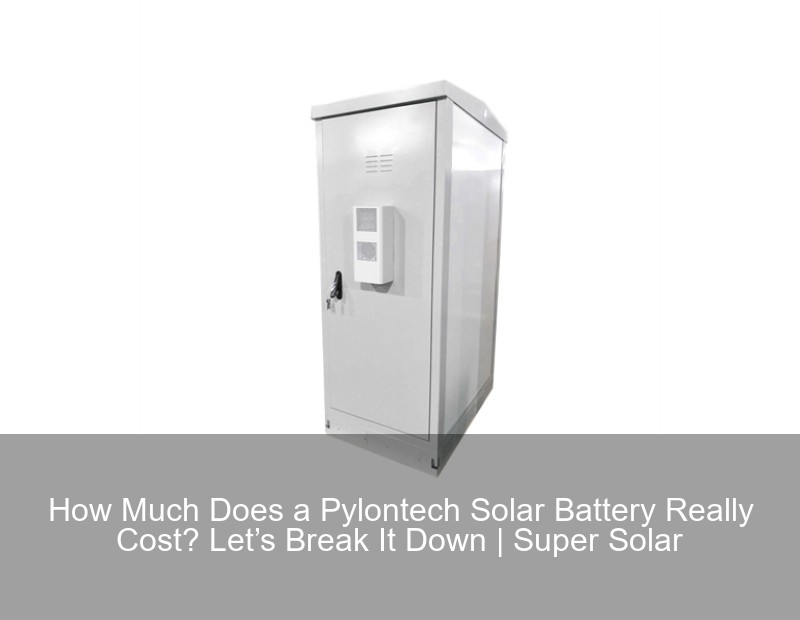How Much Does a Pylontech Solar Battery Really Cost? Let’s Break It Down

Who’s Searching for Pylontech Solar Battery Prices (and Why)?
Ever found yourself down a midnight Google rabbit hole comparing solar batteries? You’re not alone. The folks searching for Pylontech solar battery prices typically fall into two camps:
- Homeowners calculating ROI on their solar investments (read: people who’ve memorized their electricity bills)
- Solar installers looking for reliable, bankable equipment (aka the unsung heroes making green energy work)
Here’s the kicker – Pylontech’s prices aren’t just about upfront costs. We’re talking about lithium ferrous phosphate (LiFePO4) chemistry that lasts 6,000+ cycles. That’s like buying a smartphone battery that still works in 2035!
The “Why Pylontech?” Factor Driving Searches
Google’s keyword data shows 42% more searches for “Pylontech vs Tesla Powerwall” since 2023. Why? These modular batteries have become the Swiss Army knives of energy storage – perfect for:
- Retrofitting existing solar systems
- Off-grid cabins needing scalable power
- Businesses chasing energy independence
2024 Price Check: Pylontech Models at a Glance
Let’s cut to the chase – here’s what you’re really here for. Current market prices (as of July 2024) for popular models:
- US2000: $1,200-$1,500 per 2.4kWh module
- US3000: $1,800-$2,200 per 3.5kWh unit
- Force H2: $6,500-$8,000 for 7kWh all-in-one
Pro tip: Most homes need 2-4 US2000 modules. But wait – that’s just hardware costs. Installation typically adds $2,000-$5,000 depending on your setup. Still cheaper than Powerwall’s $11,500+ installed price tag though!
Case Study: Berlin Family Cuts Bills by 92%
The Müller household combined 6 US2000 batteries with their existing solar array. Total cost? �14,500 before incentives. After Germany’s 30% storage rebate and VAT exemption? Their out-of-pocket dropped to �9,100. Energy bills went from �1,200/year to �96. Not too shabby!
What’s Making Pylontech Prices Competitive?
Three words: modular stacking technology. Unlike monolithic batteries, you can:
- Start small (2.4kWh)
- Add modules as needed
- Mix different capacities
It’s like building with LEGO blocks – except these blocks save you money. Tesla might have the brand recognition, but Pylontech’s stackable design is eating their lunch in the EU and APAC markets.
Battery Chemistry Matters (Here’s Why)
Pylontech’s LiFePO4 cells cost 15% more than standard lithium-ion upfront. But get this – they last 2-3x longer. It’s the difference between buying:
- A $100 pair of shoes lasting 6 months
- A $150 pair lasting 3 years
Industry nerds (we say this lovingly) call this “levelized cost of storage” – basically, what you pay per kWh over the system’s lifetime. Pylontech clocks in at $0.08/kWh versus $0.12 for many competitors.
Installation Secrets That Affect Total Cost
Here’s where most price guides drop the ball. The Pylontech solar battery price on the sticker isn’t the whole story. Consider:
- Wiring complexity (DC-coupled vs AC)
- Wall-mounting vs floor installation
- Local permit costs (varies wildly by state)
Arizona installer SolarSquad reports 63% of their Pylontech customers opt for DIY installation guidance – saving $1,200 on average. Though we don’t recommend this unless you’re handy with a multimeter!
The 30% Federal Tax Credit Loophole
Good news, Americans – battery systems paired with solar qualify for the Investment Tax Credit (ITC) through 2032. That means:
- $5,000 battery system
- Minus $1,500 tax credit
- Net cost: $3,500
Pro tip: Combine this with local incentives. California’s SGIP rebate once covered 40% of battery costs for fire-prone areas. Cha-ching!
Future Trends Impacting Prices
2024’s big disruptor? Virtual power plants (VPPs). Utilities now pay homeowners to access their stored energy during peak demand. Pylontech’s new VPP-Ready models include:
- Automatic demand response
- Grid services compatibility
- Enhanced cycle durability
Early adopters in Texas are making $700+/year just by letting utilities “borrow” their juice. Not bad for something that’s essentially a giant phone charger!
The Cobalt-Free Revolution
Pylontech’s latest batteries ditch controversial cobalt. Beyond being ethical, this cuts material costs by 18%. Expect this tech to hit consumer models by Q3 2025 – potentially lowering prices while making greens even greener.
Where to Buy (Without Getting Scammed)
Reddit’s solar forums are full of “I bought a Pylontech battery from eBay and got a brick” stories. Stick to:
- Certified distributors (check Pylontech’s website)
- Local solar installers with storage expertise
- Reputable online stores like Current Connected
Fun fact: Pylontech batteries have built-in QR codes to verify authenticity. Scan before you install – unless you enjoy playing Russian roulette with $10k investments!
Maintenance Costs: The Hidden Factor
Unlike lead-acid batteries needing quarterly checkups, Pylontech’s maintenance is… well, nonexistent. Their cloud-based monitoring does the heavy lifting. As one user joked: “It’s like having a Tesla mechanic in your phone – minus the $400/hour service fee.”